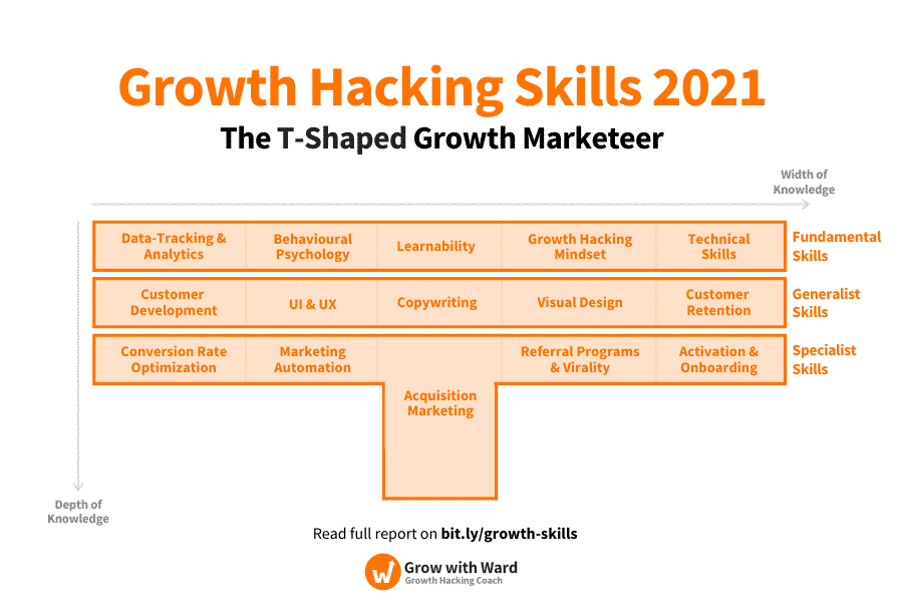Growth Hacking FAQ
Growth hacking is one of those buzzwords that’s been around for a while but often gets misunderstood.
In this guide, we’ll answer your frequently asked questions so that you understand the differences between growth hacking and digital marketing, appreciate what a growth hacker does, and more.
TABLE OF CONTENTS
- What does growth hacking mean?
- Who invented growth hacking?
- What are the most famous growth hacking examples?
- What is the difference between growth hacking and digital marketing?
- Can you apply growth hacking to content marketing?
- What is social media growth hacking?
- Why is growth hacking important?
- Is growth hacking evil?
- What does a growth hacker do?
- How do I become a growth hacker?
- How much do growth hackers earn?
What does growth hacking mean?
Growth hacking refers to a set of tactics and strategies focused solely on growth.
The goal of growth hacking is to achieve rapid growth – typically by acquiring as many users or customers as possible – while spending as little as possible.
As such, it has become popular with startups and tech brands who need massive growth in a short time on a slim budget – they either flourish, or they fail.
Growth hacking is not limited to any specific tactic and instead looks to use elements including, but not limited to, the following:
- A/B testing
- Blogging
- Display ads
- Dynamic content
- Email marketing
- Search engine marketing
- Social media marketing
- Viral marketing
Who invented growth hacking?
The term “growth hacking” was coined by Sean Ellis, founder and CEO of GrowthHackers, in 2010, when trying to draft a new job description.
AS a consultant, Sean helped numerous startups, such as Dropbox, achieve accelerated growth. But he struggled to find a replacement to continue the project when he moved on. In his own words, he was looking for “a person whose true north is growth” rather than a traditional marketer.
A growth hacker focuses on growth – they’re not concerned about traditional marketing metrics like budgets, expenses, and conversions.
What are the most famous growth hacking examples?
Some of the most famous growth hacking examples include:
- Dropbox
- Airbnb
- Hotmail
- PayPal
- Uber
- YouTube
- Dollar Shave Club
- Slack
- Uber Eats
- Tesla
What is the difference between growth hacking and digital marketing?
Growth hacking is a specialized subset of digital marketing with a different mindset and methodology.
Digital marketing is about generating leads and sales through online channels.
Growth hacking attempts to grow a business using many of the same digital channels but within a more iterative, agile, and experimental mindset and a heavy reliance on data.
For instance, some growth hacking experiments could include trying Facebook ads, interviewing clients for a blog post, and improving homepage copy. They’re all in the marketing sphere but target rapid growth.
Can you apply growth hacking to content marketing?
Yes, you can apply growth hacking to content marketing. For example, here are five content-focused growth hacks:
- Create “trickle-down” Facebook ads to increase engagement and organic reach.
- Add videos to your posts to increase “dwell time” and your rankings.
- Extend the life of your videos by editing them into standalone content for other channels.
- Create intent-based Facebook audiences and reach those most likely to buy.
- Grow your CEO’s LinkedIn profile and leverage users’ desire for human connection.
What is social media growth hacking?
Growth hacking refers to a set of tactics and strategies aimed at achieving massive growth on a slim budget — fast. You can use a growth hacking mindset not only to grow your business’ revenue or attract users to your app but also help you grow your social media audience rapidly.
Why is growth hacking important?
Growth hacking removes the need to spend much money.
Many entrepreneurs don’t always have the money to invest in paid social and paid search, endless marketing tools, and other cost-prohibitive measures.
Instead, they use innovation and creativity as their primary tools to scale their business. And in many cases, the smallest changes yield the most impressive results.
Growth hacking takes the place of cash.
Is growth hacking evil?
No, not unless you think growing your customer base and improving engagement with your product is a force for evil.
For example, what’s evil about showing two different website visitors a different headline to understand what resonates with your audience best?
In the end, better communicating what you do is beneficial to both your business and your website visitors.
In this light, growth hacking is an evolution in response to marketers’ tools and resources. Like many things, whether it’s a force for good or evil depends on how it’s used.
What does a growth hacker do?
Typical duties and responsibilities of a growth hacker include:
- Develop and implement front-end web code where appropriate to launch interactive tools and apps benefiting the marketing team’s goals.
- Collaborate with channel-specific marketing teammates (blogging, email, social media, etc.) to identify areas for growth.
- Test and optimize marketing tactics for customer acquisition (e.g. online advertising, direct mail, out of home, affiliate) and conversion rate optimization.
- Conduct and present competitive analyses and market research.
- Propose creative new projects, from building free tools and apps that attract prospects and convert leads to testing new approaches to capturing existing demand.
- Translate ideas to actionable items that deliver business results.
- Analyze, recommend and lead the implementation of improvement initiatives.
- Keep abreast with the latest trends and changes in UI/UX and digital marketing.
- Identify industry trends and insights.
Growth hacking coach, Ward van Gasteren, believes there are three levels of growth hacker skills:
- Fundamental growth hacker skills: These skills are about understanding work forms, models, and mindset, such as controlling the Growth Hacking process, the Pirate Funnel, and the Growth Hacking Mindset.
- Generalistic growth hacker skills: These are skills you’ll need in every task you’re going to do and are therefore necessary skills for all generalists, such as copywriting, behavioral psychology, and visual design.
- Specialist growth hacker skills: These skills are not necessary for every growth hacker, but you will need them when the time comes or the company you work for needs them. (You usually develop these skills ‘on the job’ when you specialize in areas like Channel Marketing and Referral Marketing.)

How do I become a growth hacker?
Here are the 8 best ways to become a growth hacker:
- Read everything you can about growth hacking.
- Find a mentor who has done growth hacking before.
- In your mind, connect everything you do to growth.
- Focus on one area of growth hacking and master it.
- Study the basics of marketing.
- Learn analytics.
- Cultivate a desperate curiosity.
- Be obsessed.
How much do growth hackers earn?
According to data compiled by job search site Indeed.com, growth hackers in the US have an average salary of $67,923.

Manage all your social media accounts in one place.
Craft, schedule, & auto-post content to all your social channels, then track analytics and manage interactions from a single, easy-to-use dashboard.
Growth Hacking FAQ in a Nutshell
Growth hacking uses a set of tactics and strategies to generate massive growth on a slim budget. Although it’s closely related to marketing, it requires a different mindset. When applied correctly, it leads to dramatic results.



